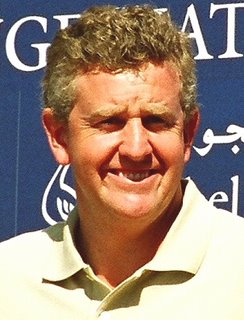
For the "Bahrain Tribune"
One of the great clichés in sport, used by fans and the media alike, is that a sportsman or a team “deserves” to win an event. Keen students of this column over the years will no doubt find that I have used this solecism myself – it is a convenient way of celebrating a popular win (or mourning a sad loss). But the reality is that sport is not about “just desserts” any more than it is (only) about style or entertainment. An “undeserved” win is always preferable to a plucky, brave loss in any sport, anywhere, anytime. As the American Football coach Vince Lombardi said “If winning isn’t everything, why do they keep the score?” The neutral spectator might like to see the gutsy trier or the underdog triumph over the knarled, cynical old pro - or the “unlucky” loser eventually get his win. Sure the tears came to the eyes when Jaroslav Drobny eventually won Wimbledon in 1954 after nearly twenty years of trying. And the same would have happened if Colin Montgomerie had won the US Open last week at Winged Foot. But however much most of us would have liked Monty to win, in reality such a win would have been no more “deserved” than that of the actual winner – the comparative rookie Australian Geoff Ogilvy. Monty comforted himself after his loss by saying that he has a good record in Majors having been second five times. Some comfort! Monty knows, in his heart, that nobody ever remembers the Runner up. No trophy, no green jacket, just that feeling deep down that it hasn’t happened AGAIN and now, at the age of 43, that it probably won’t ever happen.
It would need a skilled psychotherapist to dig deep into Colin Montgomerie’s psyche to find out why he has never, in 67 attempts over 16 years, won one of the big four despite his great success on the European Tour and in the Ryder Cup. To carry the descriptor of the “Greatest golfer never to have won a Major” (which he undoubtedly is) must continue to be deeply frustrating for this most driven of men. In fact if you dig a little deeper into Monty’s career record you will see that (one “Skins” game apart) he has never won a tournament of any sort in the United States. He doesn’t travel well - except (of course) in the Ryder Cup, the competition that really brings out the very best in him. It is this that may reveal the real reason that Montgomerie has never won a Major (three out of four of which are played in America). He only feels comfortable in the US when he has the comradeship of a team around him – perhaps in a tournament he is isolated, finds the American crowds hostile and this eventually affects his play. How different from Phil Mickleson who, like Monty, played his first Major in 1990 and also then struggled for years to win one. Then in 2004 the hugely supportive mainly American crowd at Augusta played a key part in helping him to his first win in The Masters. Maybe if Montgomerie had felt that the crowd was behind him at Winged Foot he could have won. Who knows – the crowd were certainly not hostile (as they have been on occasion in the past) but in Monty’s complex mind he may subconsciously have felt that they weren’t really behind him.
I certainly hope that Colin Montgomerie can summon up the necessary strength of character to win a Major – perhaps next month in The Open Championship at Hoylake? It is, I think, all about character not really about technique or natural ability (both of which he has to a very high level). If the conditions are right, and with a friendly crowd behind him, Monty might just break his duck in The Open. I hope that he does - not because he “deserves” to win, but because a player of his talent and one who (despite the odd ups and downs) has brought great credit to the game would be a worthy champion. Montgomerie himself certainly knows that you only win when you play at least one stroke better than the next man, not because the gods have decreed that you “deserve” your turn. Mind you, as always in golf, luck plays its part and if Monty needs the odd lucky bounce along the way few but the churlish would begrudge him that good fortune!








